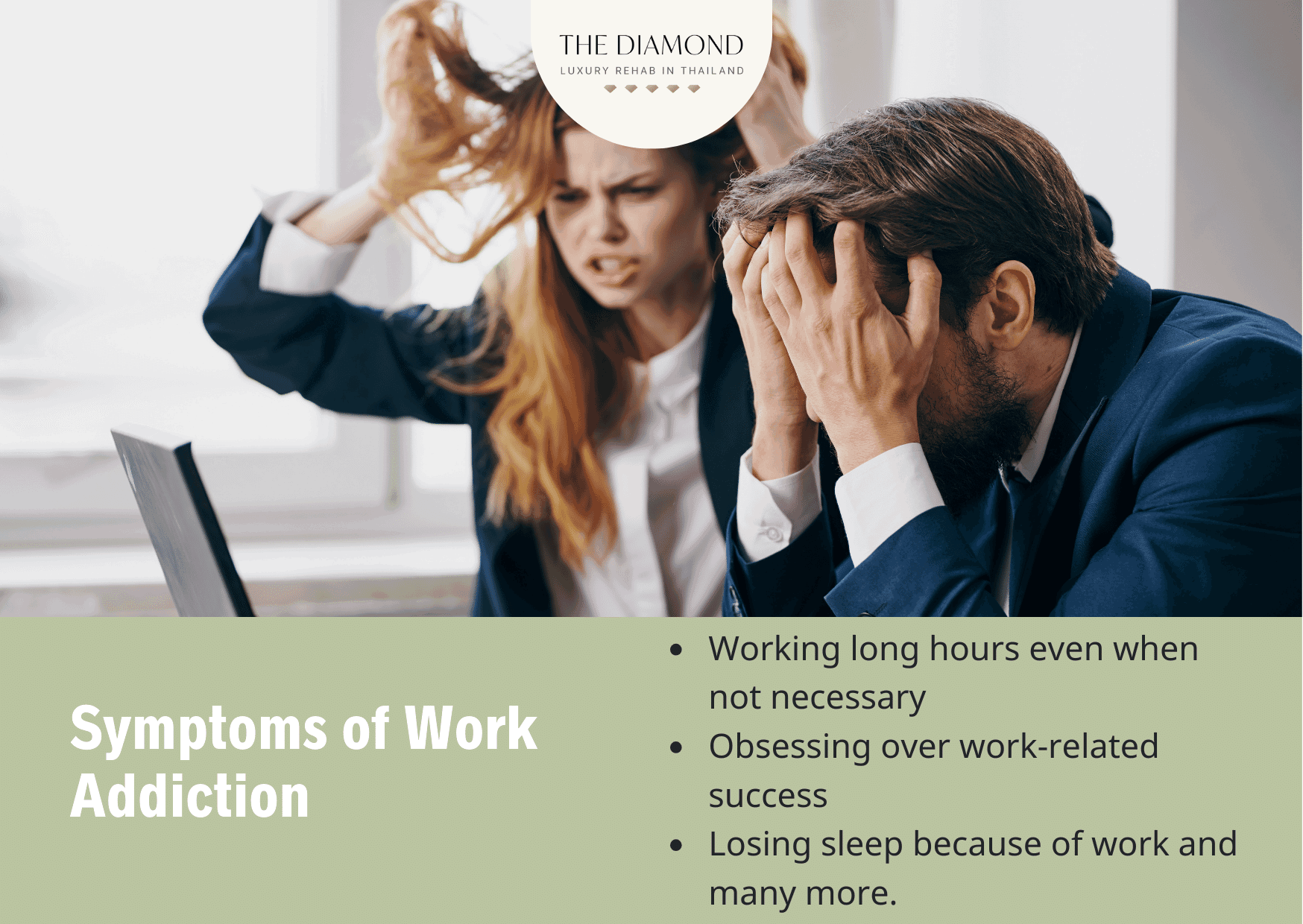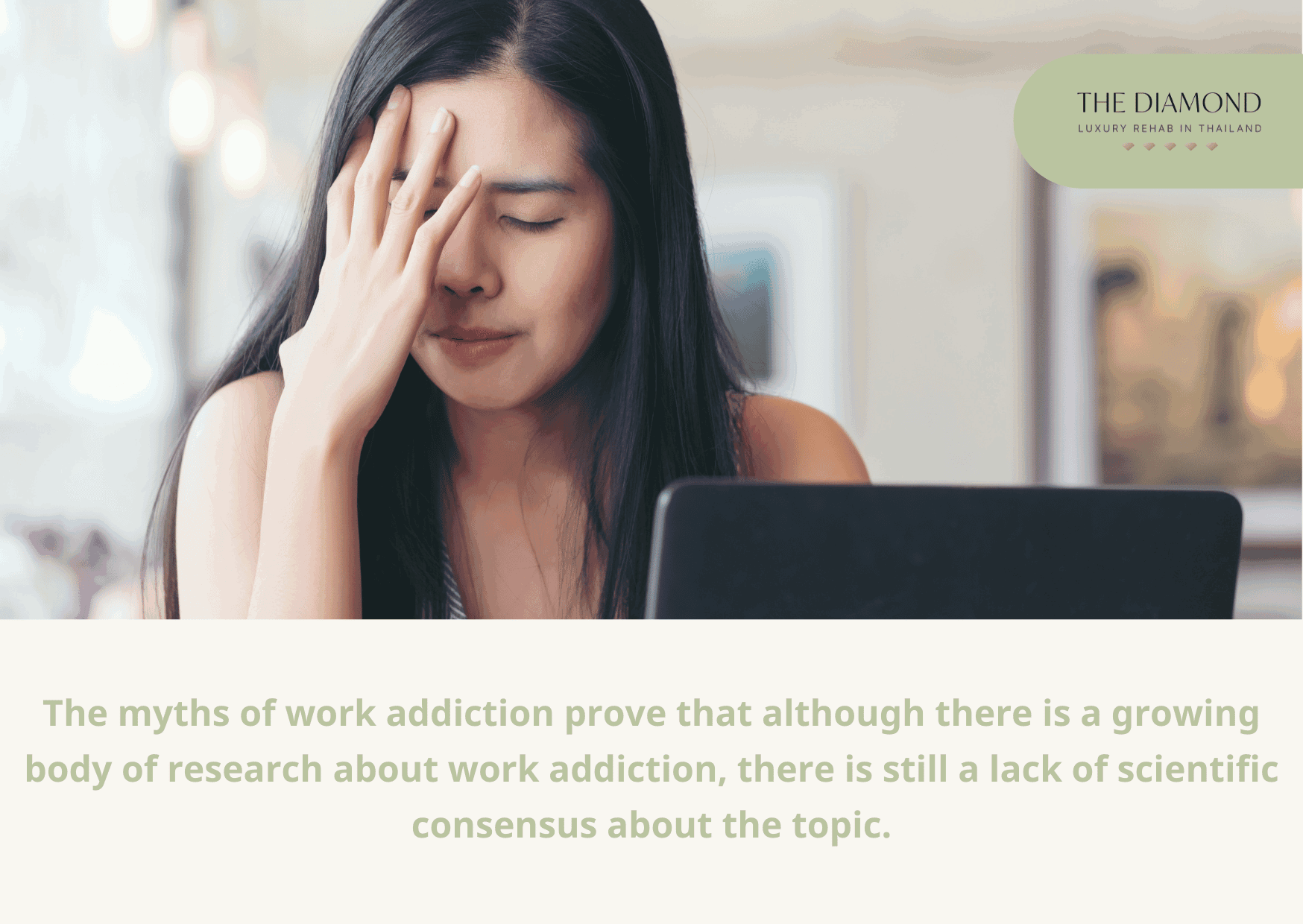Work addiction myths, signs, symptoms, and treatments
Table of content
- What is work addiction?
- When does work become an addiction?
- What are the causes of work addiction?
- What are the effects of work addiction?
- What are the signs and symptoms of work addiction?
- How to overcome work addiction?
- What are the risk factors for work addiction?
- How do you treat work addiction?
- What are the myths about work addiction?
- What are the impacts of work addiction on the family?
- What are the impacts of work addiction on mental health?
- What are the statistics about work addiction?

Work addiction refers to the compulsive or uncontrollable need to overwork and difficulty detaching from work despite causing negative impacts on many areas of a person’s life. People who suffer from work addiction may display signs of the condition.
The symptoms of work addiction include working long hours even when not necessary, obsessing over work-related success, losing sleep because of work, and deteriorating personal relationships due to overworking.
The common causes of work addiction are the need to escape adverse circumstances, overcompensation, a need for validation, and a belief that self-worth is tied to one’s career.
Work addiction may result in adverse effects, including burnout, health problems, low levels of productivity, sleep disorders, and depression. It does not only affect a person but the people surrounding them as well.
What is work addiction?
Work addiction is a condition characterized by excessive involvement in work that can lead to unwanted consequences. In a 2012 review published in the Journal of Addiction Research & Therapy, Professor Steven Sussman of the University of Southern California further expands that work addiction is also distinguished by the difficulty in disassociating from work beyond work demands and exasperation when prohibited from working. Someone with a work addiction views overworking as a positive trait and may believe that self-worth can be achieved through work.
Work addicts also tend to experience a high from working that can lead them to repeatedly engage in addictive behaviors around work, ultimately creating a strain in their lives.
When does work become an addiction?
Work becomes an addiction when the urge to work excessively goes beyond being able to pay the bills, and the person becomes unable to stop the compulsive behavior despite being aware of the resulting physical and mental health problems.
Repeated engagement in addictive behavior may be triggered by a psychological high achieved from working, which may come in the form of attention and validation.
What are the causes of work addiction?
The causes of work addiction that drive people to become addicted to work are listed below.
- Biological factors: Work addiction may be influenced by a genetic predisposition to certain addictive personality traits. Some people, including those who cannot resist impulses, may be genetically vulnerable to work addiction.
- Psychological factors: Include the psychological reward achieved from working and the need to escape negative situations in life. The psychological reward or high obtained from the workplace may come from getting great feedback from a superior that may induce brief satisfaction. This leads to feelings of pleasure and reward that make a person engage in and lose control over excessive work involvement, as explained by Professor Steven Sussman of the University of Southern California explained in a review published in the Journal of Addiction Research & Therapy. Excessive work may similarly be associated with a response to negative situations in life, such as financial crises and damaged personal relationships.
- Social factors: Work addiction may stem from social factors, including workplace policies, culture, and relationships with work colleagues. According to a 2020 review article published in the Journal of Behavioral Addictions by Professor Bernadette Kun and her colleagues from Eötvös Loránd University in Budapest, the workplace environment can also influence work addiction. Certain organizations may normalize long working hours and may consider it socially acceptable. Good workplace relationships may also contribute to work addiction as someone may feel obliged to be consistently good at work to experience more of the comfort that a work environment may offer.
What are the effects of work addiction?
The effects of work addiction that can negatively impact a person’s life are listed below.
- Physical effects: Work addiction can lead to poorer physical health problems, including physical exhaustion, sleep problems, headaches, body pains, and an increased risk for heart disease and hypertension. A 2020 paper published in the International Journal of Environmental Research and Public Health by a group of professors led by Professor Frédéric Dutheil of the University Hospital of Clermont-Ferrand in France adds that these physical health effects stem from overworking and losing sleep due to preoccupation with work.
- Psychological effects: Work addiction may manifest in psychological problems, including extreme stress, mental exhaustion, anxiety, nervous breakdowns, and depression. Experiencing burnout due to mental fatigue is common in people who suffer from work addiction and may impair non-work relationships.
- Short-term effects: Work addiction may manifest in both physical and emotional ways, including dissatisfaction with work, bursts of anger, shortness of breath, and chest pains.
- Long-term effects: Being addicted to work has long-term negative consequences, including prolonged exposure to stress that may cause family conflicts, heart problems, high blood pressure, a weakened immune system, and an increased risk for other illnesses, according to the same 2020 paper published in the International Journal of Environmental Research and Public Health. Over time, jobs with high demands can negatively impact a person’s overall well-being and can result in health issues.
What are the signs and symptoms of work addiction?

The signs and symptoms of work addiction that are potential indicators of the condition are listed below.
- Working long hours even when not necessary: Someone with work addiction may spend more time working because of difficulty in physically and mentally detaching from work. Ironically, this is often counterproductive as consistently working long hours can lead to burnout, and one may eventually fall behind in their duties.
- Obsessing over work-related success: A person with work addiction may become obsessed with achieving work-related success and constantly worry about their performance at work. In a 2014 paper published in the Journal of Behavioral Addicts, Professor Cecilie Schou Andreassen of the University of Bergen in Norway pointed out that people who believe that hard work leads to success are more likely to display work addiction symptoms. In contrast, when hard work brings personal fulfillment and satisfaction that may be lacking in other areas of life, it may result in obsessing over achieving work-related success by constantly working.
- Losing sleep because of work: A person may need to pay attention to the importance of sleep to meet deadlines and finish projects or tasks before turnaround time. According to a 2021 paper published in the International Journal of Environmental Research and Public Health by a team of researchers led by Veruscka Leso of the University of Naples in Italy, working long hours disrupts the body’s natural sleep cycle and ultimately developing sleep problems due to demanding work schedules and heavy workloads.
- Deteriorating personal relationships: As work takes up a big chunk of a person’s life, they may miss family gatherings or other important events, causing disagreements or conflicts with family members or friends.
- Using work to cope with negative feelings: A person suffering from work addiction may use work to cope with or reduce overwhelming negative emotions such as guilt, depression, or anxiety. One may also engage in excessive work to escape or numb emotional trauma.
- Being afraid of failing at work: A work addict may severely worry about the consequences of failing at work. Fear of failure may contribute to work addiction by overworking to compensate for feelings of worthlessness and unpleasant emotions in response to mistakes at work. A 2020 paper published in the International Journal of Environmental Research and Public Health by a group of professors from different European universities explains that individuals exhibiting work addiction symptoms are stimulated by externalized social standards and approval.
- Working to avoid dealing with personal circumstances: A person may use work to refuse to face reality and use it as an excuse to avoid dealing with personal issues such as a divorce or the loss of a loved one.
Other possible work addiction symptoms include:
- Tying self-worth to a job
- Experiencing high levels of stress in the absence of work
- Being unable to make time for other activities outside work
- Developing health problems due to overworking
- Ignoring requests from family or friends to cut back on work
How to overcome work addiction?
To overcome work addiction, an individual can start on focusing on restoring life balance by setting healthy boundaries at work to achieve a work-life balance. Establishing work boundaries may begin with identifying priorities where a big chunk of one’s time and energy should be allocated. Professor Steven Sussman of the University of Southern California noted in a review paper published in the Journal of Addiction Research & Therapy the importance of adopting holistic approaches that focus on life balance. These approaches include maintaining a healthy diet, regular exercise, improving the sleep cycle, stress management, and practicing meditation, mindfulness, and relaxation, which can contribute to the emotional and physical recovery from the damaging effects of overworking.
Communicating clearly with co-workers is also a crucial part of setting professional boundaries. Be upfront about only answering emails during office hours so that work will not invoke personal life.
Another important step is to remember that workers have the right to a decent quality of life. This involves taking a break when necessary, spending time with your loved ones, and taking days off when sick.
What are the risk factors for work addiction?

The risk factors for work addiction which contribute to the likelihood of developing the condition are listed below.
- Perfectionistic tendencies: People who are perfectionists are often self-critical. They tend to have unrealistically high standards and are rarely satisfied with the outcome of a task or project. Professor Bernadette Kun of ELTE Eötvös Loránd University and her fellow researchers from universities in Hungary, the UK, and Canada explained in their 2020 research paper published in the International Journal of Environmental Research and Public Health that a high level of perfectionism is associated with an increased risk of work addiction. Perfectionists may engage in excessive work to meet personal expectations and project perfectionism onto others, which can negatively impact their colleagues’ performance at work.
- Neuroticism: Individuals with higher levels of neuroticism are more likely to develop work addiction. In a 2020 review article published in the Journal of Behavioral Addictions, Professor Bernadette Kun and her colleagues from Eötvös Loránd University in Budapest found higher levels of neuroticism in adult employees, which put them at an elevated risk of work addiction. Neuroticism is a tendency toward anger, anxiety, depression, and other negative feelings. Some people with a neurotic personality may work to cope with or handle feelings of guilt, shame, and anxiety.
- Family upbringing: Family upbringing, learned values and socio-cultural experiences may play a role in developing work addiction. In a book chapter on Occupational Wellbeing, Koseoglu Ornek and Kolac from Istanbul Bilgi University and Marmara University explored the risk factors of work addiction. Factors such as stressful childhood, rewards for good work, and exposure to a competitive environment are considered risk factors of work addiction. Similarly, an individual whose parents instilled into their minds that job success is a measure of self-worth may also have problems with work addiction.
- Conscientiousness: Highly conscientious individuals are hardworking, goal-oriented, and forward-thinking. According to a paper published in Personality and Individual Differences by Professor Ronald J. Burke of York University and professors from the University of Bergen in Norway, elevated levels of conscientiousness may be a personality risk factor for work addiction. Although conscientiousness can be a good thing, it also has its downsides. For instance, conscientious people may overwork to the point of physical and mental burnout to ensure they meet deadlines.
- Hustle culture: a cultural norm in which overemphasis is given to work and productivity. This tends to normalize working extra hard to meet the demands of one’s job. Some people may work beyond their physical and mental capacity to comply with the norm.
How do you treat work addiction?
Work addiction can be treated by seeking help from mental health professionals. Treatment options for work addiction may include therapy programs, support groups, inpatient treatment, outpatient rehabilitation programs, and cognitive behavioral therapy (CBT).
In a review published in the Journal of Addiction Research & Therapy, Professor Steven Sussman of the University of Southern California elaborated on the different treatment options for work addiction, including therapy, support groups, and behavioral approach. Therapy programs can be individual, in groups, or with families. In work addiction therapies, a trained professional helps a struggling person understand the root causes behind the compulsive need to overwork. Counseling sessions also help repair damaged relationships with family members or friends that resulted from work addiction.
Some people may benefit from support groups such as Workaholics Anonymous, a 12-step program for people with the same experiences and struggles with overworking. Inpatient or outpatient rehabilitation programs may be more helpful in severe cases of work addiction. Inpatient therapy allows a person to stay inside a facility throughout recovery. At the same time, outpatient programs provide a more flexible treatment option allowing people to continue their daily lives while receiving outpatient care.
Behavioral approaches such as cognitive behavioral therapy (CBT) can help patients change thoughts and beliefs that lead them to engage in excessive work. CBT is also helpful in teaching people better-coping strategies, which can help reduce the urge to overwork.
When is work addiction counseling necessary?
Work addiction counseling is necessary when individuals experience the negative impacts of overworking on overall well-being, relationships, and quality of life. It is also essential to establish connections about how personal situations may have contributed to ongoing problems with excessive work. The core issues that increase one’s vulnerability to work addiction can be addressed by identifying incidents and events which may have exacerbated the condition.
Counseling can also help people who suffer from underlying mental health illness and other form of addiction. Work addiction can result from and exist alongside a psychological disorder. Similarly, addiction can cause mental health conditions like anxiety or depression.
What are the symptoms of work addiction withdrawal?
The symptoms of work addiction withdrawal include moodiness, increased irritability, depression, high levels of stress, and anxiety. In a 2022 article published in the Iranian Journal of Public Health, Professor Gülseren KESKİN from Ege University in Turkey highlighted that work addiction withdrawal is associated with noticeable signs of increased anxiety symptoms. Withdrawal symptoms are often experienced in the absence of work or whenever work addicts are prevented from working.
These signs of withdrawal are also seen in other forms of addiction and are considered one of the core components that make workaholism a potential addiction.
What are the myths about work addiction?

The myths of work addiction prove that although there is a growing body of research about work addiction, there is still a lack of scientific consensus about the topic. In a 2018 narrative review published in the Journal of Behavioral Addictions, Dr. Mark D. Griffiths from Nottingham Trent University in the UK and professors from Budapest and Poland discussed an extensive analysis of the different myths surrounding work addiction. One of the most common myths surrounding work addiction is that it is a new behavioral addiction when in fact, the condition has been studied for decades.
Another myth talks about work addiction and workaholism being the same entity. While the two terms are often used interchangeably, workaholism is generally seen as praiseworthy rather than alarming. Personality traits being the only factors behind work addiction is also a misconception. The truth is that aside from personality traits, a complex interplay of different factors, including organizational culture, job demands, and the workplace environment, also contribute to work addiction.
Moreover, the idea that work addiction only has psychosocial consequences is untrue. Evidence exists that the condition can cause life-threatening physical illnesses. Another prevalent myth is that work addiction only develops in adulthood when in reality, study addiction reported in students has been identified in research as a precursor to work addiction.
A claim also exists that some forms of work addiction are considered positive. However, any activity that qualifies as addiction has long-term effects that will outweigh any supposed short-term benefits. Lastly, the claim that work addiction is a temporary behavior influenced by situational factors may be a myth, as there is evidence of the persistence of excessive work in some individuals. However, more research is needed to determine prevalence rates.
What are the impacts of work addiction on the family?
Work addiction negatively impacts an individual’s family life, including alienation, feelings of abandonment, lack of time for family members, and family conflicts. As work takes over a person’s life, they can easily isolate themselves from other family members to allot more time for work.
A 2020 paper published in the International Journal of Environmental Research and Public Health by researchers from Japan and The Netherlands, led by Akihito Shimazu from Keio University, emphasizes the strong correlation between work addiction and family function.
People with work addiction tend to face work-family conflict due to excessive time and energy commitment to work. This may lead to a lack of time for family members, resulting in neglected family duties, strained relationships, frequent arguments, disagreements, and other family conflicts.
What are the impacts of work addiction on mental health?
Work addiction can negatively impact mental health. Work addiction and mental health are closely related, as work addiction can both cause and exacerbate certain psychological disorders, including anxiety, depression, and bipolar disorder. Work addiction and mental health influence each other. For instance, burnout caused by physical and psychological exhaustion from overworking can lead to dissatisfaction at work.
According to a 2018 paper published in the International Journal of Environmental Research and Public Health, Professor Cecilie Andreassen and her team of professors from the University of Bergen in Norway noted that job demands and pressure could lead to overworking, which in turn contribute to the development of anxiety/insomnia, social dysfunction, and emotional exhaustion. For work addicts who are often perfectionists and are fueled by job success, this can lead to intense feelings of anxiety and depression. Similarly, people who live with mental health conditions may use work as a means of escaping or coping with negative emotions.
What are the statistics about work addiction?
Statistics about work addiction indicate its prevalence among employed individuals, death rates, and relevant associations with age. Researchers estimate that work addiction affects 10% of American workers, while other estimates indicate that as much as 15-25% of the population has problems with overworking.
Work-related deaths are also rising. The most recent available data reveals that around 270 U.S. employees committed suicide due to workplace issues, with stress believed to be a significant driving factor. A StressPulseSurvey suggests that excessive workload and interpersonal issues are the leading causes of stress in the workplace.
A 2014 study published in PLoS One by Professor Cecilie Schou Andreassen and colleagues from the UK, Norway, and Poland revealed that among Norwegian employees, workaholism was positively associated with individuals aged 18-31 years and 32-45 years.
Work addiction damages a person’s physical, emotional, and social aspects. From an increased risk of physical illnesses to co-occurring mental health disorders and damaged personal relationships, work addiction can cause lasting problems that make daily living more difficult.

